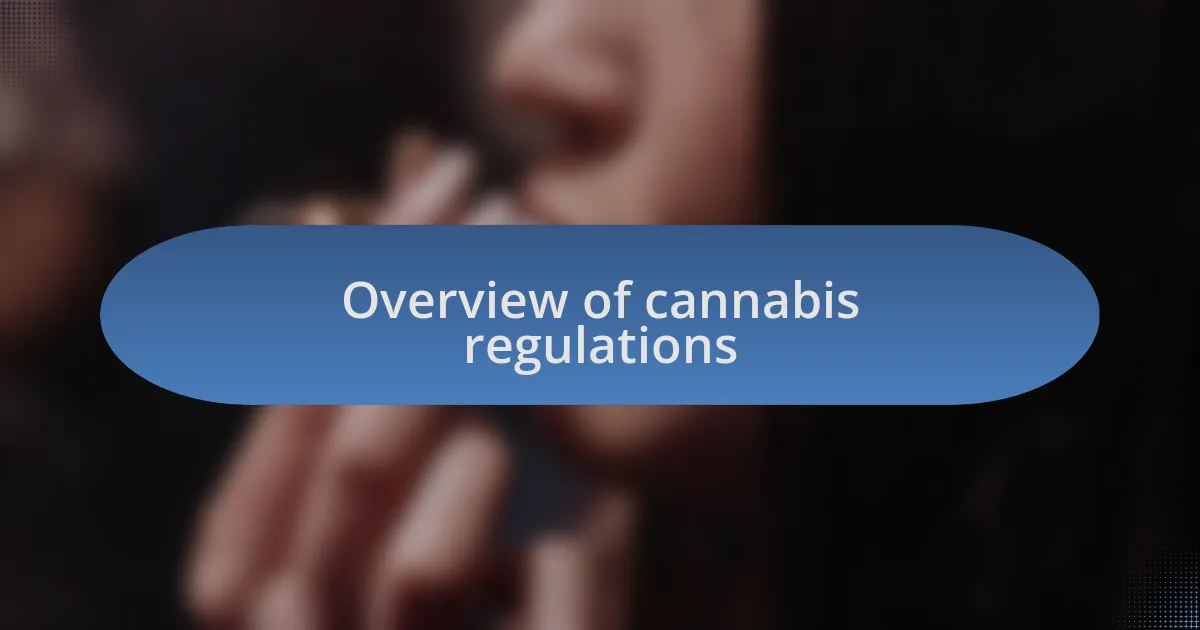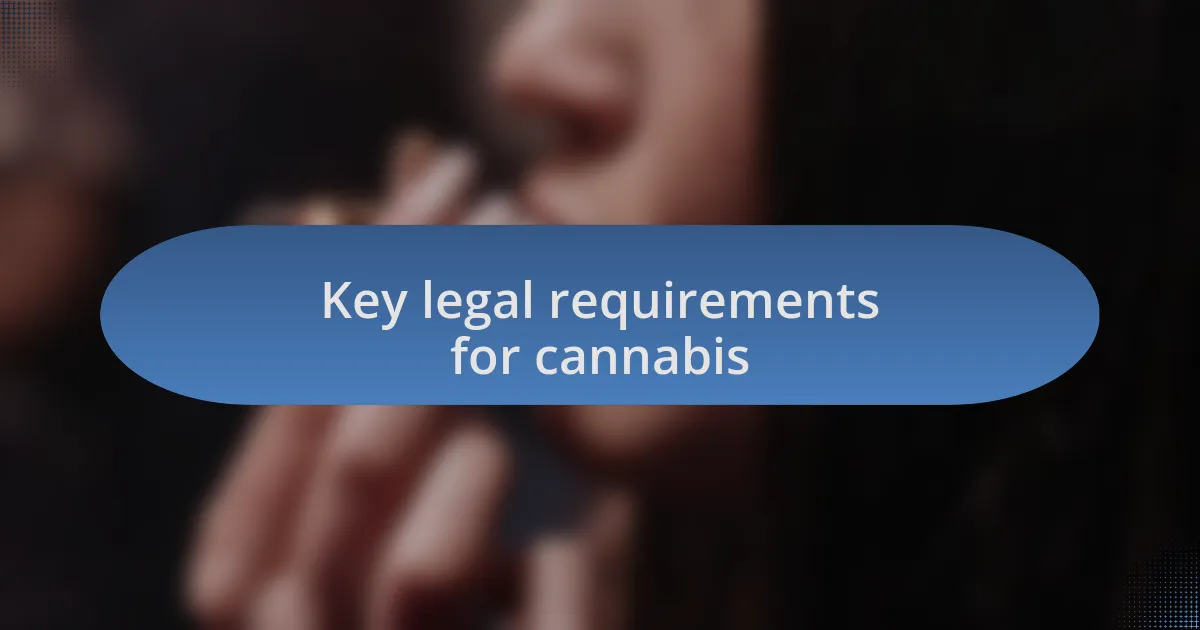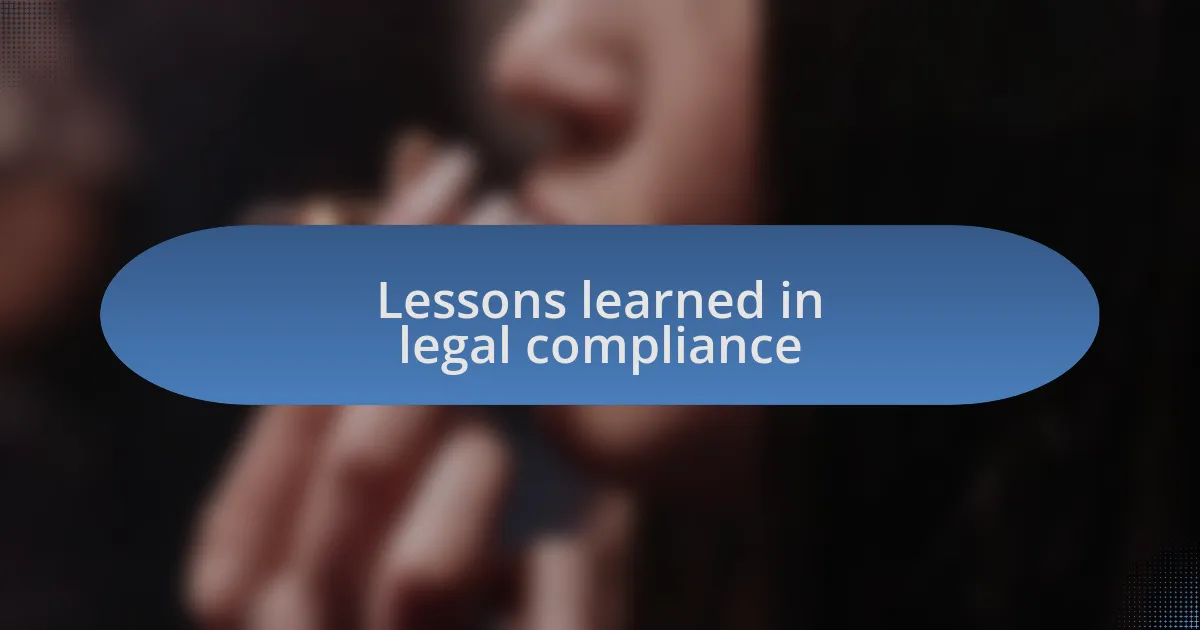Key takeaways:
- Legal compliance in the cannabis industry requires a detailed understanding of both state and federal regulations, which can dramatically affect business operations.
- Key areas of compliance include obtaining appropriate licenses, adhering to strict product labeling standards, and understanding complex tax obligations.
- Continuous staff training, robust internal auditing, and staying informed about changing laws are essential practices for maintaining compliance.
- Documentation and engaging with compliance experts play a critical role in navigating the challenges of regulatory oversight.

Understanding legal compliance
Understanding legal compliance in the cannabis industry can feel daunting. I’ve experienced moments of confusion when navigating regulations, especially when they vary significantly from one jurisdiction to another. Have you ever felt overwhelmed by the sheer volume of rules? I certainly have. It’s essential to break down these laws and truly grasp their implications on your business.
In my journey, I learned that compliance isn’t just about ticking boxes; it’s about cultivating a culture of responsibility and transparency. I remember a time when I overlooked a minor regulation, thinking it wasn’t a big deal. It turned into a costly mistake that taught me to pay close attention to every detail. What does compliance mean to you? It’s the foundation upon which trust and success are built in this industry.
One key insight is that legal compliance is an evolving landscape. I’ve seen firsthand how laws change, sometimes overnight, creating both challenges and opportunities. Staying informed is not just beneficial; it’s imperative. I often find myself asking, “How can I stay ahead of these shifts?” It’s a question that drives me to seek knowledge and connect with those who share the same commitment to navigating this complex field.

Overview of cannabis regulations
Understanding cannabis regulations is crucial for anyone involved in the industry. Each state has its own set of rules regarding production, distribution, and sale, which can be incredibly diverse. I recall a moment when I first attended a local cannabis compliance seminar; the sheer variety of regulations left me both fascinated and anxious. How can anyone keep track of what’s permissible?
One fascinating aspect of cannabis regulations is their ever-evolving nature. It’s not just a matter of knowing the current laws; I’ve seen changes occur rapidly after new legislation is introduced. For instance, after a recent legislative session in my state, I had to pivot quickly to adapt my business practices. Have you ever had to scramble to adjust your operations to meet sudden changes? That experience taught me the importance of remaining flexible.
In terms of compliance, it’s essential to understand both local and federal regulations simultaneously. While some states are more progressive, federally, cannabis remains classified as a Schedule I substance. This dissonance can create confusion and potential risks for businesses. I remember the time I miscalculated the implications of federal law on my business practices, which led to some serious re-evaluations. Isn’t it critical to understand these nuances to avoid pitfalls? This interplay of state versus federal law is a balance I continually navigate.

Key legal requirements for cannabis
Understanding the key legal requirements for cannabis starts with licensing. Each state mandates specific licenses for cultivation, processing, and retail operations. I remember the first time I submitted my application; it felt daunting. The details had to be perfect, and I worried about potential mistakes. Have you ever felt that pressure, knowing a single error could jeopardize everything?
In addition to licensing, many jurisdictions enforce strict product labeling standards. It’s crucial for businesses to accurately list ingredients and usage instructions—there’s no room for ambiguity. I vividly recall an instance when I received a cease-and-desist order because my labeling didn’t comply with local regulations. The stress was overwhelming, but it underscored the need for meticulous attention to detail.
Finally, compliance with taxation laws is another layer that cannot be overlooked. Cannabis businesses face unique tax structures that can be challenging to navigate. There were times when I felt overwhelmed by the complexity of it all, unsure if I was on the right track. Does this resonate with you? Understanding the latest tax regulations has been vital for my success, and it’s an ongoing education that I must prioritize.

Best practices for compliance
Maintaining compliance is a continuous journey, and one of the best practices I’ve found is developing a robust internal audit system. Regularly reviewing our practices not only keeps us compliant but also reveals areas for improvement. I remember when my team discovered gaps in our inventory tracking; it felt like a wake-up call. Have you established processes that help you catch issues before they escalate?
Another effective strategy is investing in staff training—everyone on the team needs to understand regulations and their implications. I often hold workshops where we dive into compliance scenarios. The engagement and dialogue that arise can be insightful, transforming dry regulations into relatable scenarios. Seeing my team grasp the importance of compliance in a practical context was truly satisfying. What training approaches have you found most effective in your experience?
Lastly, I cannot stress enough the importance of staying informed about changing regulations. Subscribing to legal updates and networking with industry peers have been lifelines for me. There was a time I missed a crucial change in local laws, which resulted in a frustrating fine. It was a tough lesson, but now I actively seek knowledge. How do you keep your finger on the pulse of compliance changes in this ever-evolving landscape?

Personal experience with compliance
Navigating compliance in the cannabis industry is more than just checking boxes—it’s about fostering a culture of accountability. I recall a recent compliance review that made me confront some uncomfortable truths about our operations. The experience was eye-opening; it’s easy to grow complacent, but having those difficult conversations pushed us to strengthen our policies. Have you ever had to face the music in your own compliance journey?
In one instance, we faced a potential compliance breach due to a miscommunication in our supply chain. I felt an overwhelming sense of responsibility for my team, prompting me to implement clearer communication channels moving forward. I learned that proactive measures, like establishing clear protocols, can prevent panic down the road. How do your team dynamics play a role in maintaining compliance?
Another memorable moment was when we celebrated a successful internal compliance audit. I was filled with pride as I reflected on how far we had come as a team. We had tackled numerous hurdles along the way, and the collective effort felt rewarding. What victories, big or small, have you celebrated in your compliance efforts?

Lessons learned in legal compliance
One of the key lessons I’ve learned in legal compliance is the importance of documentation. I used to underestimate how crucial it was to maintain thorough records until we had to demonstrate our compliance during a surprise inspection. The stress of that day was palpable, but having organized documentation transformed what could have been a chaotic situation into a more manageable one. Have you considered how your documentation practices could impact unexpected compliance reviews?
I also discovered the value of continuous training for staff. Initially, I thought a single comprehensive training session would suffice, but I found that the regulatory landscape is always evolving. Regular updates not only keep everyone informed but also help instill a strong compliance mindset within the team. How often do you revisit training materials to adapt to new compliance regulations?
Lastly, engaging with compliance experts can provide insights that are invaluable. I remember attending a workshop led by an industry expert who shared real-world scenarios that transformed my understanding of compliance pitfalls. These interactions have shown me the power of learning from others’ experiences. Have you sought feedback from experts to enhance your compliance strategy?